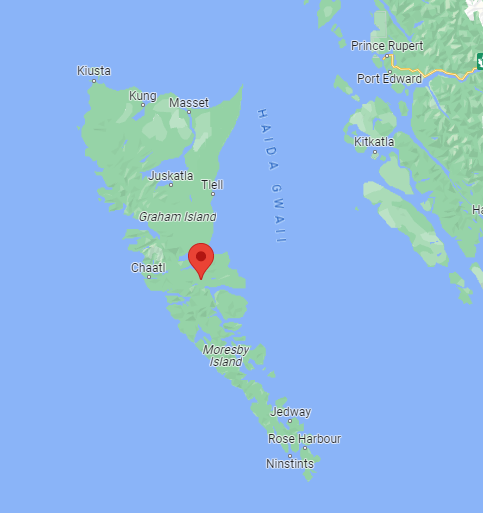NEW provincial legislation supports the Haida Nation’s inherent right of governance by recognizing the Council of the Haida Nation (CHN) as the government of the Haida Nation in provincial law.
The new legislation represents a significant step toward reconciliation, or Gud ad T’alang HlG̲ang.gulx̲a Tll Yahda • Tll yá’adee G̱ii gud ahl t’álang hlG̱ángulaang (“People working together to make it right”).
A contingent of Haida Nation members, including Gaagwiis Jason Alsop, President of the Haida Nation, travelled to Victoria from Haida Gwaii to speak to members of the legislative assembly from the floor of the British Columbia legislature about what the bill means to the Haida Nation and to witness the passing of the legislation.
“One of the barriers in reconciling our differences with B.C. and Canada has been the lack of formal recognition of the Council of the Haida Nation as the governing body of the Haida Nation and of our inherent title and rights in Haida Gwaii,” Gaagwiis Jason Alsop said on Tuesday. “This act begins to right that wrong and serves to lay a proper foundation for negotiations of recognition of Haida title. Today, we are finally able to acknowledge each other and to work, government-to-government, with respect and integrity. The Haida Nation welcomes and celebrates this legislation.”
The legislation, titled the Haida Nation Recognition Act, is the latest in a number of mutual commitments. Together, the Haida Nation, B.C. and Canada have been working toward reconciliation for more than two decades.
“It’s long overdue that we legally recognize with provincial legislation the rights of the Haida Nation and the Council of the Haida Nation as the Nation’s government,” said Murray Rankin, B.C. Minister for Indigenous Relations and Reconciliation. “This legislation was jointly crafted every step of the way and is the result of a progressive and incremental approach toward reconciliation.”
In 2021, the Haida Nation, B.C. and Canada entered into the GayG̱ahlda “Changing Tide” framework to advance collective work on reconciliation. GayG̱ahlda is the framework for the parties to negotiate further agreements leading to Crown recognition of Haida governance and Haida title on Haida Gwaii.
“This legislation is a significant and important step needed to enact the GayG̱ahlda agreement, recognizing the self-determination of the Haida Nation,” said Jennifer Rice, MLA for the North Coast. “I am proud that the Council of the Haida Nation and B.C. are working shoulder-to-shoulder to achieve lasting reconciliation in Haida Gwaii.”
As a first step in this work, the parties have negotiated a tripartite Haida Nation recognition agreement, in which B.C. and Canada agree to legislate recognition of the inherent rights of governance and self determination of the Haida Nation and the Council of the Haida Nation as its government. The new legislation fulfils that commitment for the Province.
Collectively, reconciliation agreements and supporting legislation provide a foundation for further steps to be taken together, government to government, to fulfil responsibilities and create a path for a better future together.
Learn More:
Learn about the Haida Nation: https://www.haidanation.ca/
GayG̱ahlda “Changing Tide” framework agreement: https://www2.gov.bc.ca/assets/

BACKGROUNDER
Information about the Haida Nation
* The legislation recognizes that the Haida Nation has the inherent right of governance and self-determination and that the Council of the Haida Nation (CHN) is the governing body of the Haida Nation, as authorized by the Constitution of the Haida Nation.
* The CHN has been the governing body for the Haida Nation for more than 40 years.
* Haida Gwaii is located approximately 100 kilometres west of the northern coast of British Columbia and is a group of more than 200 islands totalling approximately one million hectares (3,750 square miles). The Haida have been on Haida Gwaii for millennia.
* The CHN was formed in 1974 and the Constitution of the Haida Nation was formally adopted in 2003.
* The constitution mandates the CHN to conduct the external affairs of the Haida Nation and to steward the lands and waters of Haida Gwaii on behalf of the Haida Nation, ensuring that the Haida relationship with Haida Gwaii continues in perpetuity.
* The CHN has negotiated and signed agreements with other coastal First Nations, non-governmental organizations and local communities, and continues to work on agreements with both the federal and provincial governments.










